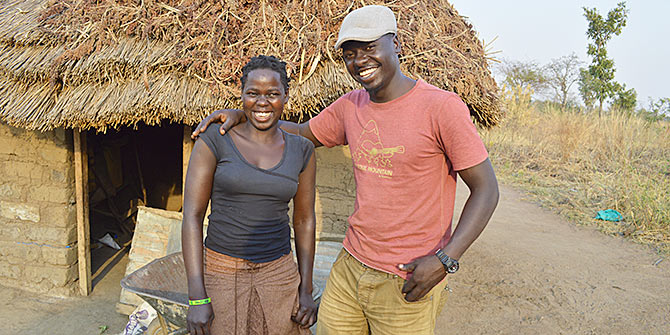Twenty years on from the Rwanda genocide, LSE’s Omar McDoom reflects on what lessons have been learned and what changes have been effected as a result.
Rwanda’s genocide, twenty years ago this month, symbolises the zenith of ethnic violence in Africa and international indifference toward it. How did this defining event change our world? It is true that mass atrocity is still not a ghost of the past and international inaction in the face of it is still not an unthinkable choice. Events in the Central African Republic and Syria today serve as dark reminders of each of these realities. Yet we would be overly cynical to think nothing has changed. The hundreds of thousands of lives brutally taken in Rwanda left a mark on the world’s conscience and moved us a little closer towards making ‘never again’ a credible promise.
Inaction over Rwanda moved Kofi Annan in 2001, as UN Secretary-General, to ask when intervention is ever justified. “[I]f humanitarian intervention is, indeed, an unacceptable assault on sovereignty, how should we respond to a Rwanda, to a Srebrenica—to gross and systematic violations of human rights that offend every precept of our common humanity?” A year later, in a paradigm-shifting answer, an international commission re-cast state sovereignty as responsibility rather than control. While neither universally accepted nor legally binding, the notion of a ‘responsibility to protect’ (R2P) decisively entered the lexicon of international relations. R2P signifies more than mere rhetorical change. In authorising intervention in Darfur in 2006, the UN Security Council took the unprecedented step of explicitly invoking R2P. Its normative power is reflected in the more robust mandates of UN peacekeeping missions since Rwanda. The protection of civilians is now central to UN operations in the DRC, Mali, Ivory Coast, and South Sudan.
The tribunals established for Rwanda, and for Yugoslavia, also lent momentum to the movement for an international institution of criminal justice. The idea had waxed and waned for decades. But the International Criminal Court opened its doors eight years after the genocide. Critics accuse it of inefficiency and political bias: two convictions in 12 years and all eight investigations focused on Africa. Yet the Court still stands as perhaps the most significant achievement of the human rights movement since the end of the Cold War. Rwanda also helped draw the world’s attention to the scourge of sexual violence during war. In a landmark judgment, the Prosecutor vs Akayesu, the International Criminal Tribunal for Rwanda recognised rape, if intended to destroy a group, as a ground for genocide.
Rwanda’s violence has also generated much research and taught us much about ethnic conflict and genocide. Research has, for instance, helped debunk the myth that tribal violence on the continent is the product of ancient, immutable hatreds. We now know the genocide was the premeditated choice of a small elite intent on staying in power. Rwanda has also become a cautionary tale for international mediators about the risks of using democratisation as a strategy for ending civil wars. Multipartyism brought ethnic extremism to the forefront of Rwandan politics. The newly-created opposition parties helped push the ruling elite into taking radical steps to ensure its survival.
Research on Rwanda has also cast light on a dark side of the human psyche: how ordinary people become capable of extraordinary violence. An estimated one-in-five ethnic Hutu men committed violence during the genocide. My own research suggests this remarkable level of popular participation may be traced in part to Rwanda’s remarkable population density. The dense social networks that characterised rural Rwanda amplified the powerful social forces of conformity, coercion, and cooptation at work during the genocide.
But what has changed inside Rwanda itself since the genocide? The country has enjoyed a remarkable period of social stability. There has not been a serious incident of ethnic violence in Rwanda for nearly two decades. Donors have praised the country’s astonishing development. Economic growth has averaged over 6% per year, poverty and inequality have declined, child and maternal mortality have improved, and primary education is now universal and free. Rwanda has shown, in defiance of expectations, that an African state can deliver security, public services, and rising prosperity.
Yet, politically, there is some troubling continuity with pre-genocide Rwanda. Power remains concentrated in the hands of a small, powerful ethnic elite led by a charismatic individual with authoritarian tendencies. In form, current president Paul Kagame and his ruling party, the RPF, the heroes who ended the genocide, appear to exercise power in a manner similar to former president Juvenal Habyarimana and his ruling MRND party, the actors closely-tied to those who planned the slaughter. The genocide is testament to what unconstrained power over Rwanda’s unusually efficient state machinery can enable.
Furthermore, today, as before, it is unclear how succession will occur. After two decades in office, president Habyarimana was assassinated and his regime overthrown through force and with enormous bloodshed. President Kagame is also approaching the twenty-year mark. Rwanda’s history tells us that on each of the three occasions power has changed hands from one ethnic elite to another, 1959-62, 1973, and 1994, it has been with violence. While few believe mass violence likely to recur, peaceful regime transition is the most important break with the past that many hope Rwanda’s future holds.
This post originally appeared on African Arguments.
Dr Omar McDoom is an Assistant Professor in LSE’s Department of Government.
For more posts on the Rwanda genocide, please follow this link.





2 Comments